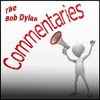I heard the sound that Gordon Lightfoot was getting, with Charlie McCoy and Kenny Buttrey. I’d used Charlie and Kenny both before, and I figured if he could get that sound, I could…. but we couldn’t get it. (Laughs) It was an attempt to get it, but it didn’t come off. We got a different sound… I don’t know what you’d call that… It’s a muffled sound.
~Bob Dylan (to Jann Wenner November 29, 1969)
John Wesley Harding finds Dylan had once again heading off in a wildly different direction. God knows it sounds way different than the previous album, hard to miss that fact. John Hinchey, the author of Like a Complete Unknown, writes: “The Dylan who shows up on this record performs one of the most astonishingly abrupt about-faces in the history of rock ‘n’ roll”. The writing style has changed as well. The Beats are no longer a primary influence. Thematically it’s a bit different too. The lyrics indicate a markedly different philosophical outlook.
The entire album was recorded with just Dylan on harmonica and acoustic guitar, Charlie McCoy on bass, and Kenny Buttrey on drums. The two country-ish songs also include Pete Drake on steel guitar. The sound is muted, soft, and subtle, with no wild guitar hi-jinks from the likes of Mike Bloomfield or Robbie Robertson.
Although it’s non-electric, it doesn’t sound like a folk record. Yet, outside of Down Along the Cove and I’ll Be Your Baby Tonight, it’s not really a country sound either. Producer Bob Johnston said, “I don’t think it’s really country; some of it is like country; some of it is like the ’29 dust-bowl days of Woody Guthrie”. [1]Discogs.com listing for John Wesley Harding
It might be asked,”why the abrupt change?”. But of course, who among us would be surprised by an abrupt change from Dylan? Many have guessed that the sound was a reaction to the psychedelic pop music that was becoming very popular at the time, perhaps best represented by The Beatles’ hugely influential Sargent Pepper recording. Personally, I’m not buying that. Dylan has been quoted that he had been reading the Bible on a daily basis and listening to the music of Hank Williams around the time. [2]Sounds, Down the Highway Certainly this is a much more likely source of the album’s sound, much more likely than Dylan plotting to bring down the new sound of the Beatles.
The writing style is also obviously radically different. No more Beat-like “motorcycled Black Madonna two-wheeled Gypsy Queen”. No more “20 pages of vomit” Like a Rolling Stone. The songs of John Wesley Harding are short and concise, none more than a few stanzas. In fact, John Gibbens notes six of the songs consist of eight quatrains with the same AABB rhyme pattern. Several of the songs are written as parables, obviously influenced by the Bible.
Many commentators have noted that the theme of many of the songs centers on salvation and guilt, themes that were notably absent from the earlier work. I Dreamed I Saw St. Augustine and As I Went Out One Morning are two obvious examples. Gibbens also notes that several songs describe “states of bondage followed by a subsequent release” (Drifter’s Escape being the most obvious). David Pichaske notes that the album has a “new sense of guilt and need for atonement”.
Yet the more things change the more they stay the same. Although there are clearly differences, there are also similarities with what came before. One constant theme of Dylan’s work is the outsider hero. The outlaw hero in the song John Wesley Harding echos the admiration for the outlaw in many earlier Dylan songs, such as Outlaw Blues, It’s All Right Ma, I’m Only Bleeding, and Absolutely Sweet Marie, to name just a few. Another persistent theme is a protest against society’s misguided, old-fashion norms, such as Drifter’s Escape, As I Went Out One Morning, which are reminiscent of earlier songs such as Maggie’s Farm and Just Like Tom Thumb’s Blues. Also, Dylan’s work often warns of some coming apocalypse, such as A Hard Rain Is Gonna Fall, and The Times They Are A’Changing. John Wesley Harding has plenty of that, the most notable example being All Around the Watchtower.
Interesting trivia: According to Clinton Heylin (The Recording Sessions), the songs for the album were written all within a five-week period, and the entire album was recorded in three-afternoon sessions.
John Wesley Harding didn’t have the impact of the three landmark albums that preceded it. It didn’t change the world of pop music. But that’s too much to ask. Harding is a substantial piece of work in which Dylan the seeker boldly moves his art in a new direction both musically and lyrically. Bucking the current pop music trends, Dylan sets off into a new musical direction, not folk and not country. Lyrically, he abandons the Beat influences, choosing instead a concise William Blake-ian style, heavily influenced by the parables of the New Testament.
Other information/links:
http://archive.rockpaperscissors.biz/index.cfm/fuseaction/current.articles_detail/project_id/755/article_id/22062.cfm
Link to a Singout Broadside issue. See page 12 for JWH interpretations.

